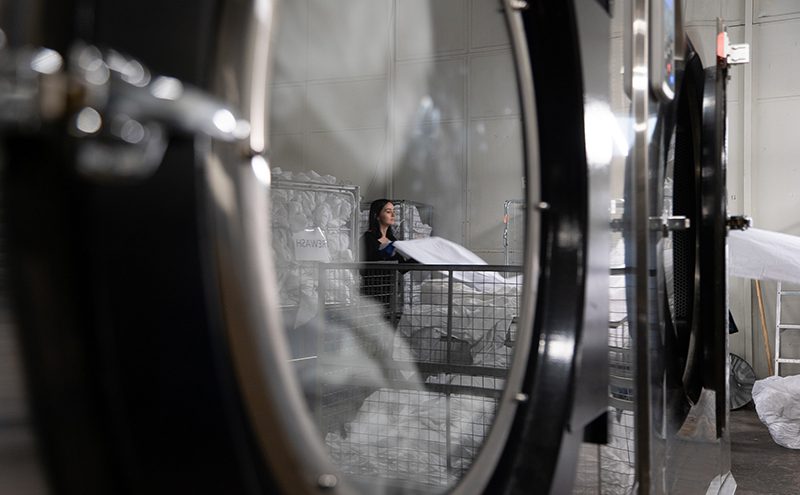
A new commercial cleaning operation – designed to tackle the UK’s mounting textile waste issue – has been launched following a seemingly successful two-year pilot.
Bradford-headquartered Regenex began as nothing more than an idea back in late 2016, when founders David Midgley, Paul Hamilton and Matthew Whitehead sought to challenge the status quo – and carbon footprint – in the laundry sector.
This UK laundry market reportedly processes almost 750,000 tonnes of hotel linen and towels, plus workwear garments, and linen for the healthcare sector, per annum. This is said to produce 281,500 tonnes of CO2. But with some laundries estimating that up to 50% of hotel linen is returned unclean – and therefore deemed little more than ‘waste’ – the environmental impact of this throwaway approach is staggering.
Half a million pounds – plus 24 months of research and development – has been invested into devising a new solution to boost the amount of commercial linen and workwear reclaimed for reuse.
A meticulously developed solution incorporating a number of new techniques together with sophisticated chemistry, has allowed Regenex to process 300 tonnes of otherwise-condemned material, during the pilot project – 100% of which would have otherwise been ragged or landfilled. 74% has been successfully reclaimed and returned to commercial laundries’ pool stock, to continue its useful economic life.
Commenting on the venture, managing director David Midgley said: “Unfortunately, the UK lags behind many of our European neighbours when it comes to waste hierarchy excellence for textiles –something that has to change. Legislative pressures aside, consumers are starting to push back on this environmental ineffectiveness – we only have to look at the recent Stacey Dooley programme on fast fashion to see that people are increasingly intolerant of damage to our planet. This cannot continue.
“This isn’t to say that the industry has sat back and done nothing. Continuous batch washing systems have made great headway in the reduction of energy usage, for example, but the effectiveness of this approach is limited when it comes to removing difficult stains ranging from self-tan, concrete marks to mildew. We’ve been told that up to 50% of linen returned to hotels for example, is still dirty. For many people, this renders items as nothing but ‘waste’, which we know is not the case. We’ve therefore come into the industry with a fresh pair of eyes, and hope that by challenging the status quo we can complement the efforts of the continuous batch washers – enabling the UK to “love its linen for longer.”
70% of a cotton bedsheet’s carbon footprint is said to be generated in the harvesting, manufacturing, packaging and transporting of the product – before it has even been used. The Regenex team therefore knows that if they can extend the life of a perfectly salvageable piece of linen, they can avoid triggering this weighty carbon impact once again.
Keen to further minimise the net environmental damage of the process, steam and hot water from the Regenex plant is used by neighbouring textiles facilities. The process uses a gentle, multi-bath approach and for the small proportion of linen that cannot be successfully cleaned, the team prioritises an overdyeing process that enables towels, bedlinen and workwear to be reused, simply in a different colour.
From a fiscal perspective, the average net cost saving of Regenex-reclaimed linen and workwear is 35% – when compared to clients having to re-purchase each item – but this figure has reached up to 80% for chefs’ apparel.
“The financial benefits of the Regenex solution are vast, but with so many variables at play we invite clients to work through our step-by-step calculator to uncover the impact for their individual laundry scenario,” expanded David.
Now a fully-commercial operation employing 12 people and with capacity to handle at least 15 tonnes of linen per week, Regenex is on the hunt for more clients in 2019 and beyond. The management team is even offering a 400kg free trial to commercial laundry businesses in the UK, to demonstrate the effectiveness of the new system.
“We’ve comfortably processed 40,000 napkins to date, from virtually every corner of the UK,” added David. “This is just one of many statistics we’re proud to boast from our pilot project, so I’m incredibly excited to see what 2019 will bring.”








